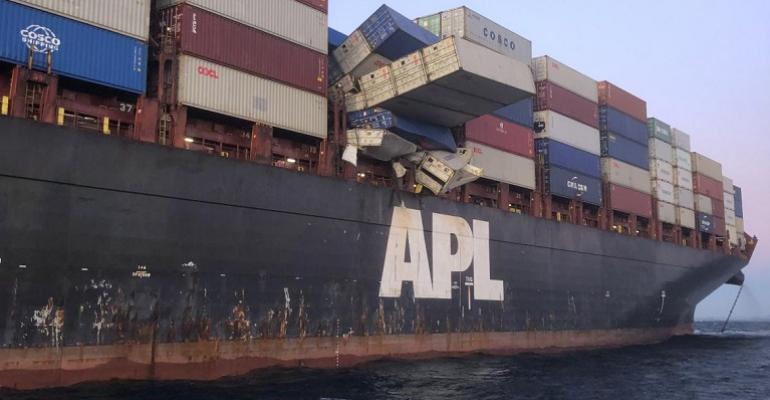With the Master of APL England facing trial over the vessel being unseaworthy after it lost 50 containers overboard, Michael Grey questions the definition of unseaworthiness.
A certain amount of common sense prevailed the other day at a court in Brisbane, which threw out charges of pollution against the Master of the containership APL England, which lost 50 boxes over the side in a storm off New South Wales in May 2020. However, the court decided that charges that the ship was unseaworthy would be pressed against the ship’s Master and the case must go to trial.
It may be recalled that the Australian accident investigators discovered corroded fittings and damaged container guides, along with some missing lashing eyes, when they inspected the ship after it reached port. The Malaysian Master of the ship remains on bail, although he was permitted to leave the country.
This case, along with a number of other court judgements are reminders that the definition of what comprises the charge of unseaworthiness has been hugely expanded to encompass virtually any item of the ship’s equipment, or procedures that might be deemed deficient in the aftermath of an incident. Seaworthiness itself is a legal concept, one that has come to mean that the ship is perfectly equipped for the intended voyage; able to withstand any of the risks it may encounter.
It has been suggested that the promiscuous use of unseaworthiness allegations actually runs up against the age-old ability of a seafarer to “work around” a problem. In the past, if the radar broke down, it was only an “aid” to navigation and a navigator was trained to operate without this item of equipment. It was defined as “good seamanship” and covered a multitude of means for overcoming any deficiencies.
Now with a working radar mandated, this option is removed and there are scored of items of equipment which now will, with the perfect hindsight available after an accident, have become crucial contributors to the seaworthiness of the vessel.
A Master who knew a ship well and was concerned about the deck stow might exercise good seamanship to divert around bad weather. Today, the ability of the individual Master to do just this will be questioned by the courts in the event of a dispute, while the use of weather routeing services may have reduced the element of discretion to just about zero.
Unrealistic expectations
It might also be suggested that the ability of the Master to oversee, and thus retain complete responsibility, for every item of the ship and its operation, has become quite unrealistic.
For example, is the Master (or indeed any one of the ship’s officers delegated such a task) to take responsibility for the state of every one of thousands of deck fittings on a hard-driven container ship? Would it be either reasonable or practical – in the eyes of the owner or charterer – if the master demanded non-scheduled repairs to some items of corroded fittings discovered during a container exchange, thus holding up the subsequent loading? No prizes for answering this question.
With the authority of the Master being constantly circumscribed and the discretion of those aboard ship to undertake even routine tasks being reduced by the advance of onshore operational management, it is surely time that the role of the master as one legally responsible for everything that goes on aboard the ship is subject to review. It is manifestly unfair that decisions taken by the master, or elements that are far beyond the master’s competence, knowledge or practical jurisdiction are second-guessed with perfect hindsight by law enforcement authorities, or courts with no practical knowledge of ship operation. It is wrong that the master should be the “pig in the middle” between the authorities pressing charges and those ashore in management who are effectively calling the operational shots.
If the master of the APL England, Singapore-flagged, owned by CMB Ocean Leasing, ISM management CMA CGM, is found guilty, will we see a sudden rush to inspect all the container fittings on ships around the world, with repairers called out at all hours to make good any corrosion or breakages? Why would any of this happen, when there are insurers to pay the fines and masters, who may end up with criminal convictions, to take the rap?
Source: Seatrade Maritime News






